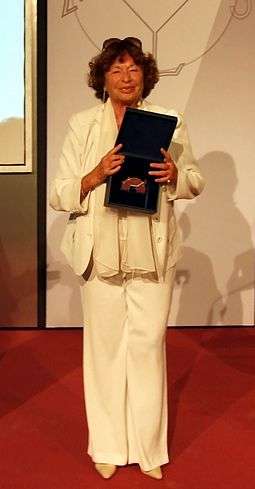Inge Feltrinelli
| Inge Feltrinelli | |
|---|---|
 Inge Schönthal–Feltrinelli receiving the 2011 Charlemagne Medal for European Media | |
| Born |
Inge Schönthal 24 November 1930 Göttingen, Germany |
| Died |
20 September 2018 (aged 87) Milan, Italy |
| Nationality | Italian |
| Occupation | Photographer, publisher |
Inge Feltrinelli (née Schönthal; 24 November 1930 – 20 September 2018) was a German-born Italian photographer and director, who with her son Carlo ran the Italian publishing house Giangiacomo Feltrinelli Editore.
Biography
Inge Schönthal was born on 24 November 1930, before her father, who was of Jewish descent, moved to the Netherlands in 1938. Her Jewish background led to her expulsion from a Gymnasium (secondary school) in Göttingen.[1]
After World War II ended,[1] she began her career as photographer in Hamburg. In 1952, during a long stay in New York City, she was able to photograph Greta Garbo, Elia Kazan, John Fitzgerald Kennedy and Winston Churchill. She also made friends with Erwin Blumenfeld. Among her most celebrated photos are those of writers Ernest Hemingway, Edoardo Sanguineti, Allen Ginsberg, Günter Grass, Nadine Gordimer and artists Pablo Picasso and Marc Chagall.[2]
She met Italian left-wing publisher Giangiacomo Feltrinelli in 1958, whom she later married in Mexico and followed to Milan (he had two previous marriages). She took charge of international relations for the publishing house and eventually became the de facto head of the publishing house, as Feltrinelli a few years later embraced the “struggle for the revolution against imperialism”.[3][4]
In 1969, she was named vice-president in a company restructure decided by Feltrinelli (who remained President in name only) in anticipation of his transition to clandestine activities.[3] When her husband died three years later, during an attempted terrorist attack on the Milan electricity network,[5] she became president of the company, which she led together with her son Carlo.[3]
Other significant details – such as the scope of her influence on the existential choices by Feltrinelli and her contacts with Soviet entities – are described and documented in the “Interview with Inge Schoental” published on 11 November 2011 by the Russian-American weekly Kontinent USA.[6]
Publications
References
- 1 2 "Inge Feltrinelli mit 87 Jahren gestorben". Der Tagesspiegel (in German). 20 September 2018. Retrieved 22 September 2018.
- ↑ Feltrinelli, Inge (2012). Fotografien (1., Aufl. ed.). Göttingen, Niedersachsen: Steidl. ISBN 9783869305295.
- 1 2 3 Feltrinelli, Carlo (2002). Feltrinelli: A Story of Riches, Revolution, and Violent Death. Harcourt. ISBN 9780151005581.
- ↑ Michaelsen, Sven (4 March 2013). "Seize the Right Moment". 032c. Retrieved 1 December 2013.
- ↑ Indro Montanelli and Mario Cervi (1991). L'Italia degli anni di piombo. Rizzoli. ISBN 8817428051.
- ↑ "Interview with Inge Schoenthal". Kontinent–USA. 11 November 2012.
Further reading
- Knigge, Jobst C.. Feltrinelli – Sein Weg in den Terrorismus, Humboldt Universitaet Berlin 2010
- Scarzella, Luca & Fiori, Simonetta (2010), “Inge film” DVD and book, Feltrinelli, Milano ISBN 978-8-8077-4065-7